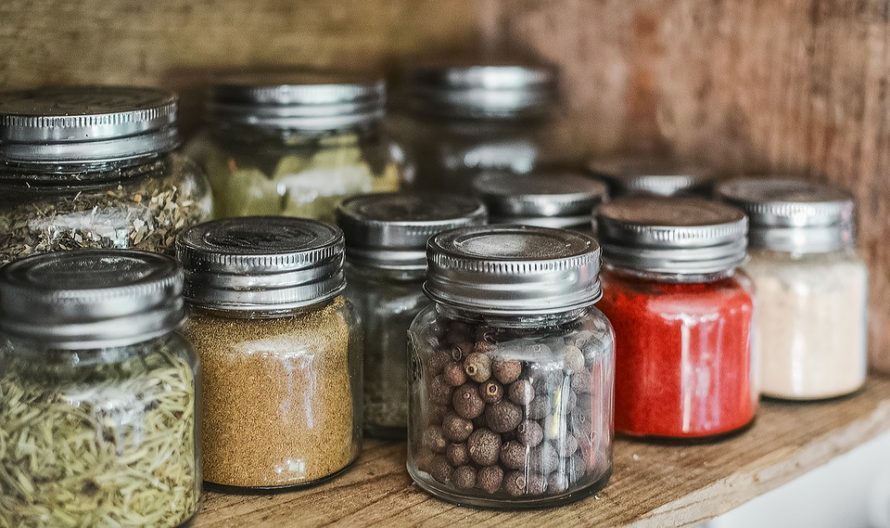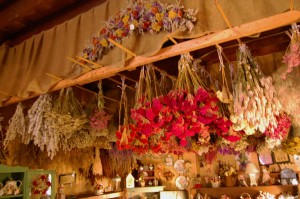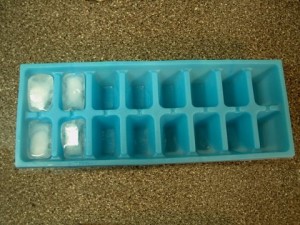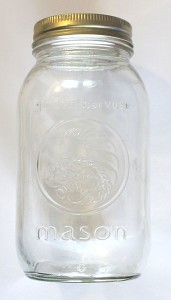The onset of winter doesn’t mean you will no longer have herbs to use. There are many ways to preserve your herbs, ensuring a steady supply until your herb garden comes to life again in the spring.
Drying Your Herbs
The classic way to preserve herbs is to dry them. Drying herbs concentrates their flavors because the natural moisture is lost and just the oils which give them their flavor and scent remain. Not only will herbs keep longer when dried, but you will need smaller amounts of them than you do when using fresh herbs.
Choose a space that is dry, well-ventilated and out of the sunlight. Basements are not good candidates for drying herbs because they tend to be damp which will encourage the growth of mold. Window-less garden sheds, although dark and dry, have no ventilation and would encourage mold to grow. Lack of sunlight is very important because sunlight destroys the oils which give herbs their flavors and scents. Using the sun to dry your herbs will result in less flavor and scent.
Herbs that are harvested with their stems intact can be tied in a bunch and then hung upside down in a well-ventilated space out of the sunlight. Remember that herbs shrink as they dry, so use a rubber band to secure your bunches. If you use string, as the herbs dry and shrink, the string will eventually become too big and your herbs will fall to the floor. Don’t make your bunches too big. This will prevent proper air circulation so the herbs in the center of a large bunch will not dry and could become moldy. Six to ten stems should be your maximum. After the herbs have finished drying, you can strip the leaves from the stems and store them in jars in a cool, dark place.
If you are drying flowers or individual leaves, you can dry them in a single layer on a window screen propped between two sawhorses or chairs. The screen allows air to circulate all around the herbs so that they dry evenly and mold will not grow.
Herbs can also be dried in the oven. Spread them in a single layer on a cookie sheet that is lined with parchment paper and bake them in a 110°F oven for 2 to 3 hours. Be careful not to leave them in the oven too long or they may burn. Remember, you are trying to dry the herbs, not cook them.
Herbs can also be dried in a microwave. Place them on paper towel or microwaveable dish and “cook” them on high for 1 to 2 minutes.
Food dehydrators are another popular way to dry herbs. Follow the directions for your unit for best results. If you have trouble with tiny leaves falling through the shelves, line the shelves with a few layers of cheesecloth.
Freezing Your Herbs
A great way to have fresh herbs all winter is to freeze them. The easiest way is to use an old fashioned ice cube tray. Coarsely chop your freshly harvested herbs and place the chopped herbs in each cell, then fill the tray with water and freeze.
The second way to freeze your fresh herbs takes a little more effort. Place your herbs in a single layer on a cookie sheet lined with parchment paper and place the cookie sheet in your freezer. When the herbs have frozen, you can remove them from the cookie sheet and place them in plastic bags in your freezer. If you try to freeze your herbs directly in the plastic bags, condensation will form. Using the cookie sheets first, allows the moisture in the herbs to evaporate before being placed in the plastic bags.
Regardless of which method you use to freeze your herbs, once you have defrosted them, you cannot refreeze them. Try to only defrost as much as you need at a time.
Herb Vinegar
Herbs can also be used to flavor vinegars. You simply drop 2 or 3 small sprigs (4” or less) of fresh herbs into 1 cup of vinegar. Store your herb vinegar in a tightly capped jar in a cool, dark place. Vinegar will keep indefinitely because it is acidic.
An alternative way to make herb vinegar is to infuse herbs into it. Fill a clean, sterilized jar ¾ with fresh herbs and then pour in apple, wine or rice vinegar (no white vinegar). Tightly seal the cap and store in a cool, dark place for 3 or 4 weeks, shaking it occasionally. When the flavor has fully developed, strain out the vinegar using a coffee filter or cheesecloth. Store your herb vinegar, tightly capped, in a cool, dark place.
Herbal Culinary Oils
You can only use fresh herbs to flavor culinary oils if you are planning on using your oil within a week. You must keep your herbal culinary oils refrigerated during that week or mold will form. To make your herbal culinary oil, drop 1 or 2 sprigs (4” or less) of fresh herbs into 1 cup of oil.
To make an herbal culinary oil that will keep up to 2 months, heat 2 ½ cups of culinary oil in a saucepan with 1 teaspoon of peppercorns and 6 to 8 sprigs of dried herbs. Gently simmer until bubbles form around the edges of the pan. Remove the pan from the heat and allow the oil to cool. Pour the oil and herbs into sterilized jars and tightly seal. Store in a cool, dark place for up to 2 months.
Herbal Salts
Add a little flavor to your salt with herbs. This works best using herbs that have hard stems such as thyme, rosemary, oregano and marjoram. Spread the fresh herb leaves on a cookie sheet and then cover with salt. Add a second layer of herbs and salt on top of the first layer and allow to dry for up to a week in a cool, dark place. Alternatively, you can dry the salt and herbs in your oven on low. When completely dry, pour the salt and herbs into a blender or food processor and combine. Store in a jar with a tight fitting lid.
Herbal Sugars
Herbal sugars can be used in a number of ways and are easy to make. Wrap 2 tablespoons of dried herbs or 4 tablespoons of fresh herbs in cheesecloth and place it on top of 1 cup of sugar in a wide mouthed canning jar. Put the lid on and shake. Leave the wrapped herbs in the sugar for up to 4 weeks, shaking occasionally. Then remove the herbs and store the herbal sugar in the same jar in a cool, dark place.
Herb Butter
A fun way to use fresh herbs all summer and winter is to make herb butter. Soften 3 ½ ounces of butter. Mix in fresh herbs then let it sit for a few hours to allow the flavors to saturate the butter. Put it into the refrigerator to harden before use. Alternatively, butter can be frozen up to 4 months.
Storing Your Dried Herbs
You should store your dried herbs whole, rather than chopped like store bought herbs. Chopping them or crumbling releases their flavor which you don’t want to do until you are ready to use them.
Store your herbs in tightly sealed, glass containers. Metal reacts with the oils in your herbs so you don’t want to use metal containers to store your herbs. Soft plastic will absorb the oils and rob your herbs of their flavor. Hard plastic can contain BPA which is a known carcinogen so I always recommend using glass to store herbs. Mason jars are a good choice, just make sure to only partially fill the jars so that your herbs don’t touch the metal lids.
Dried herbs should always be stored in a cool, dry place with no sunlight. Heat, moisture and light can all rob your herbs of their flavor.
If you have dried and stored your herbs properly, they will last up to a year. After a year, they start to deteriorate and lose flavor. They are still usable; they just won’t have as much flavor.





10 Comments on “Preserving & Storing Your Herbs”
is there a difference between freezing in water vs. in oil?
When freezing in water, most people want to just use the herb. When freezing in oil, the purpose is to use both the herb and the oil that it was frozen in.
When storing fresh dried herbs in Mason jars, should the jars be sterilized then left to dry??
Sterilization is nice but not absolutely necessary. I usually just run them through my dishwasher before storing herbs in them.
I dried a bunch of rosemary in my food dehydrator then placed it in a glad hat with tight fitting cork. I have several herbs stored this way. Only the rosemary grew a fluffy white mold that filled the jar. What happened? How do I prevent it?
What happened is that there was moisture in the container. Not all of the moisture was removed by your food dehydrator. Try drying your rosemary for a longer period of time before sealing it in a container.
My only choices to store my herbs are a cool, not as dry place (my basement) or a warm, well ventilated and drier space in my upstairs closet. Neither is ideal, as one is not dry, and the other is probably too warm. Which should I choose?
I assume that you are talking about dried herbs. Store them in a tightly sealed container like a mason jar which should keep most of the moisture out so that you can store them in your cool basement.
Is it best to store herbs in a dark glass mason jar, such as amber or blue? If I use a dark-colored jar and vacuum seal it, how long might they last?
The color of the jar doesn’t matter. What’s important is that it be stored somewhere dark, out of the sunlight. Dried herbs will last one year. After that, they start to lose their potency or flavor.